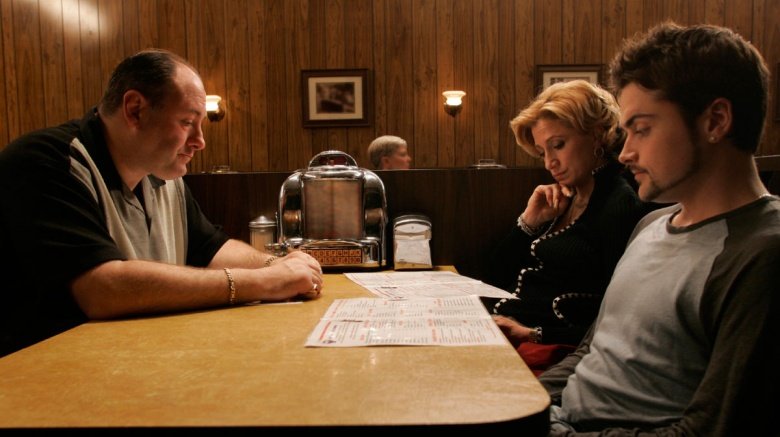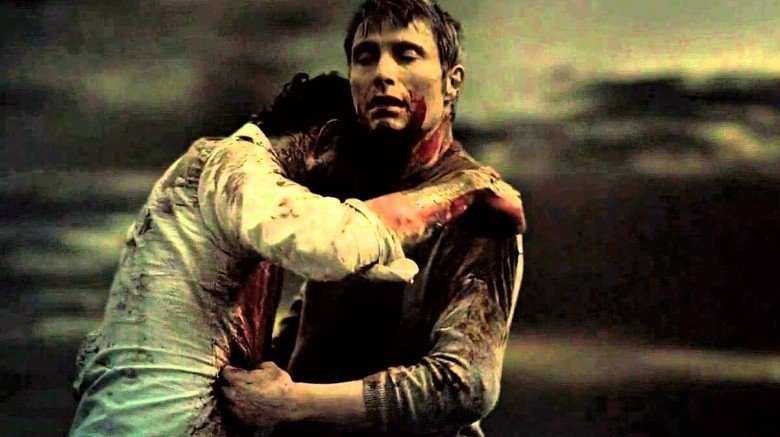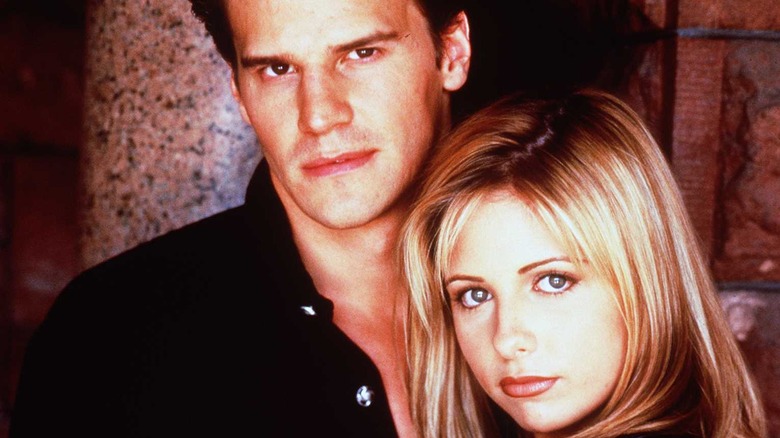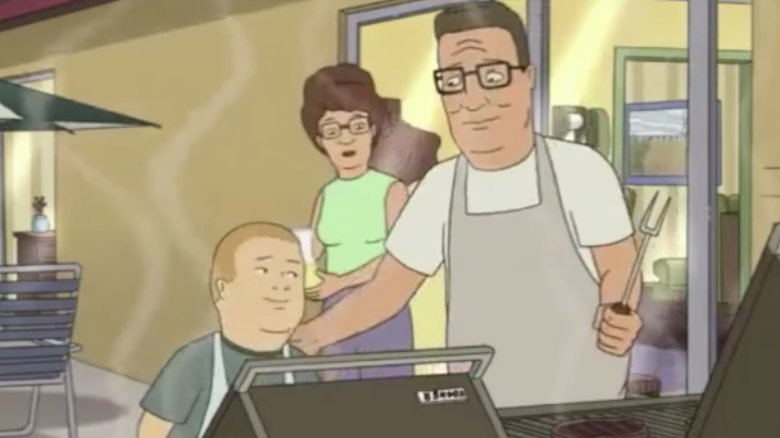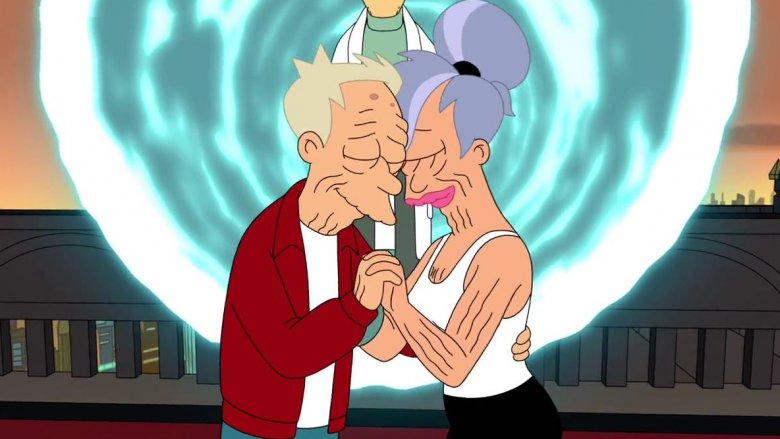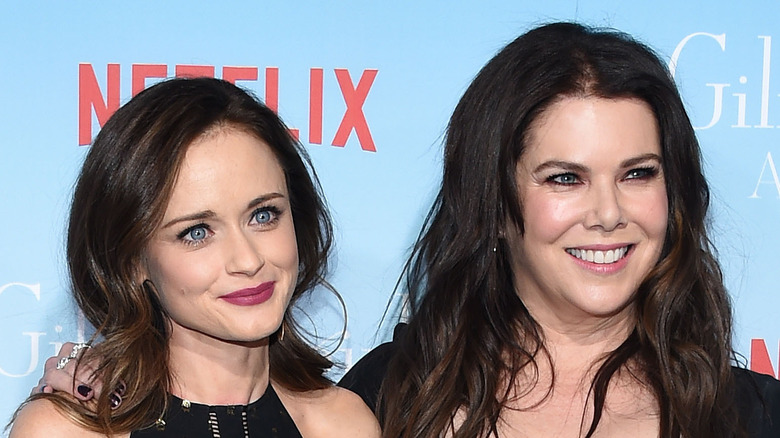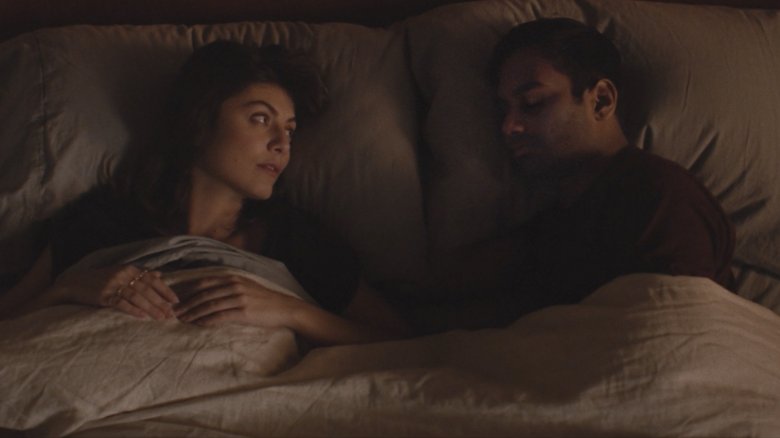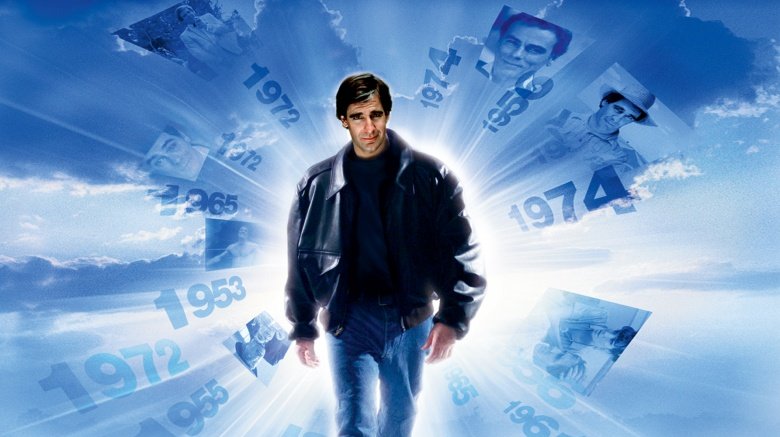TV Show Endings That People Still Don't Understand
The last episode of a long-running favorite show may trigger many emotions. Sadness because something beloved is ending, the sense of closure that comes from a happy ending, or even confusion—particularly when a show caps a successful storytelling run by ending on a note that's vague or open to interpretation. Writers are artists, and sometimes that's the best way to end a story; the only problem is that audiences can be left in the dark. Here are some TV show endings that required a little unpacking.
The Sopranos (1999)
This is one of the most infamous finales of all time, simply for how abrupt it is. Tony and his family are sitting at a diner, listening to Journey's "Don't Stop Believing." During the scene, Tony notices a man looking around the diner, and then the screen quickly cuts to black. It was so abrupt that many viewers thought something went wrong with their cable feed. According to series creator David Chase, the ending implied two things. First, that Tony was always going to be paranoid, but not that he was in any particular danger at that moment. Second was that endings for guys like Tony Soprano usually come out of nowhere. All we're saying is that there might have been a way to get that point across without making people think their TVs were broken.
Mad Men (2015)
After nearly a decade of multiple marriages, affairs, suspect business decisions, and drinking way too much — often as a way to run from his past as the unloved son of a prostitute and war veteran who stole the identity of a dead commanding officer — Don Draper finds solace. The final moments of the seven-year series depict Don meditating atop a grassy knoll at a retreat in California. Then the footage cuts to the 1971 Coca-Cola commercial in which young people of many cultures sing from atop a similar hilltop about how they'd "like to teach the world to sing in perfect harmony" and how they'd also "like to buy the world the Coke."
The mixed messages of that commercial — and Don's history as a creator of advertising — made for a confusing ending. Did Don simply find the peace he needed? Or did he find a way to reconcile his new outlook on life with his duties as an ad man ... and go on to actually create that famous Coca-Cola commercial? Or is the cut between Don and the ad indicating that the '60s of Mad Men are over, and that the new, feel-good era of the '70s have arrived, and Don is ready to embrace that?
While those are all fine interpretations, Mad Men creator Matthew Wiener has gone on record to say that Don did, in the world of the series, come up with that Coke ad. "Why not end this show with the greatest commercial ever made?" he said. "I am not [into] ambiguity for ambiguity's sake. But it was nice to have your cake and eat it too, in terms of what is advertising, who is Don and what is that thing?"
Cheers (1993)
Major sitcoms tend to go out with a bang. Friends ended with Ross and Rachel finally reuniting. Seinfeld concluded with the gang's callous behavior landing them in prison. The 98-minute Cheers finale, "One for the Road," played with a massive shift in a character's life—Sam Malone (Ted Danson) gets on a plane to Los Angeles with his one-time love Diane (Shelley Long, who'd left the show six years prior) but ultimately decides to stay single—and to stay in Boston.
The final moments of Cheers are potentially confusing because viewers are accustomed to sitcoms clearly wrapping up long-running storylines and character arcs, but Cheers ends on a quiet, somewhat ambiguous note. In the final moments of the series, Sam turns out the lights at the bar and calls out "Sorry, we're closed" to a late-arriving customer. It was a suitably poignant farewell for longtime fans who wanted more, but there's no reason to believe Sam meant it literally—he no doubt returned the next morning, along with all the other regulars the audience came to love during the show's acclaimed 11-season run.
Roseanne (1997)
For eight seasons, Roseanne brought something sorely lacking from television at the time: stories about blue-collar people who lived in the Midwest. But the relatable, realistic family comedy, created and led by comedian Roseanne Barr, underwent a major shift in its ninth and final season: the Conner family won more than $100 million in the lottery.
The last season sputtered along with episodes exploring the once-struggling family being suddenly wealthy (along with a subplot about Roseanne's husband Dan having an affair), wrapping up in May 1997 with a bizarre twist: The whole series was a book written by Roseanne. But she'd taken some creative liberties to cope with and escape some harsh realities. Notably, Dan didn't have an affair...because he'd died from a heart attack. This revelation and others came out of nowhere, and happened offscreen—Roseanne gives them to the audience via voiceover in the last minutes of the series, explaining much of the events seen on the show never happened.
It's all made even more confusing because ABC will air a Roseanne revival during the 2017-18 TV season—and John Goodman will be back as Dan Conner.
St. Elsewhere (1988)
St. Elsewhere was one of the most critically acclaimed dramas of the '80s, nominated for the Outstanding Drama Series Emmy during five of its six seasons. Set in a third-rate Boston hospital called St. Eligius (thusly nicknamed "St. Elsewhere"), it made stars out of Denzel Washington and Howie Mandel, but wasn't often the most innovative or brain-bending show—it was a quality, but standard hospital drama. Or at least it was until its WTF series finale, 1988's "The Last One."
In the last moments of the show, Dr. Westphall (Ed Flanders) and his son, Tommy (Chad Allen), who is on the autism spectrum, watch the snow fall from a window in Dr. Auschlander's (Norman Lloyd) office. The scene cuts to an exterior shot of St. Eligius...which morphs into a scene of a snow globe, held by Tommy in an apartment. Westphall enters in a construction worker's uniform and tells his father (also played by Lloyd) "I don't understand this autism thing, Pop," lamenting that he spends his day staring at the snow globe. Then the trio leave to wash up for dinner, leaving the globe behind.
What just happened here? The entirety of the six-season run of St. Elsewhere was all in Tommy Westphall's mind—he imagined his father and grandfather were doctors in the hospital in his snow globe.
Battlestar Galactica (2004)
In 2004, the Syfy channel shocked fans by taking a classic, 1970s show about space hippies and turning it into a gritty story about the last humans trying to survive in outer space. These humans were from another galaxy, After their homes were destroyed by the robotic Cylons, the survivors ventured out into space, looking for the lost human colony of Earth. In the final season, they find Earth, but it is a nuclear wasteland and everyone is dead. During the finale, the humans eventually settle down on a primitive planet, which turns out to be the Earth of the past.
Earlier in the final season, Kara "Starbuck" Thrace dies, but she later returns under mysterious circumstances. Once the team settled on Earth, she has a nice moment with Apollo and simply disappears. According to executive producer Ron Moore, Starbuck had in fact died, but she had been brought back to life by a higher power to lead the humans to Earth. Whether or not that higher power was God, or if she was an angel, demon, or alien was purposely left vague. We're just glad our favorite character got to return before the end.
Hannibal (2015)
Bryan Fuller's stylish horror series inspired by Thomas Harris's novels (and by extension, the Oscar-winning film series that included The Silence of the Lambs), ends on a cliffhanger. No, it literally ends on a cliffhanger. Murderous cannibal Hannibal Lecter (Mads Mikkelsen) and FBI profiler Will Graham (Hugh Dancy) had a deep connection because they could both understand the mind of a murderer, but were also enemies, because they were on opposite sides of the law, and Hannibal tried to kill Will and pretty much everyone else over the three-season run of the show.
Their very complicated relationship culminates in brutal combat, and then they fall off a seaside cliff. Series over. One or both characters technically could have survived, had the low-rated show been renewed for a fourth season. The ambiguity and door-left-open-potential is bolstered by a post-credits scene, in which Hannibal's enabler and psychiatrist, Bedelia (Gillian Anderson), is waiting at a dinner table with two empty place settings, and her own severed leg ready to be served.
But that was just the show's creators hedging their bets. The series was resolved when Will fell off the cliff and took Hannibal with him—Hannibal had successfully wooed Will to the dark side once and for all. (And if Hugh Dancy has anything to say about it, he thinks they didn't survive the fall. "I'm sorry to say, but if we never see them again, then they never made it from their fall off the cliff.")
Then again, Hannibal must've survived. How do we know? Movies. Those things.
Angel (2004)
When this spinoff of Buffy the Vampire Slayer debuted in 1999, it was about vampire Angel's small Los Angeles private detective agency. By the end of the fifth season in 2004, the show had evolved into a story of a grand war between good and evil, in which Angel (David Boreanaz) and his cohorts were determined to destroy the wicked Circle of the Black Thorn.
The final shots of the series finale (titled "Not Fade Away") show Angel and the good guys literally heading into a battle against a massive army—just as the episode ends. It isn't hard to understand why viewers might have been confused, but as Angel co-creator Joss Whedon told TV Guide Online, the final scene of the series demonstrates the notion that the war between good and evil is never over. "The point of the show is that you're never done," he argued. "No matter who goes down, the fight goes on."
Weeds (2012)
The last episode of Showtime's long-running show about suddenly widowed suburban mom Nancy Botwin (Mary-Louise Parker), who must turn to selling marijuana to make ends meet, tried to do quite a lot in its final episode. Things got pretty jumbled, as the show attempted to resolve most every loose end (but not all of them), show what happened to most every character (but not all of them), and give everyone a happy ending, with a sudden time jump a few years into the future.
By that point, marijuana is legal, and Nancy and her business partner/son Silas (Hunter Parrish) have apparently gone legit, with several successful marijuana-based business endeavors. (The show could've actually shown Nancy and Silas growing their business, but instead just says it happened.) Nancy's once-little son Stevie is now 13 and preparing for his bar mitzvah. (Nancy's last husband, a rabbi named David, died offscreen in a car crash.) The orphaned son of one of Nancy's other husbands, Tim, once tried to kill her, but now he's working for Nancy as her business manager, so it would seem they patched things up. Celia (Elizabeth Perkins), a main character in the early years of the show (Elizabeth Perkins) isn't mentioned at all, but her husband Dean (Andy Milder) is around, and mentions that their daughter transitioned from female to male. Shane Botwin (Alexander Gould) is an unhinged cop. Andy Botwin (Justin Kirk) hasn't spoken to Nancy in years, but comes home and mentions he has a daughter.
At the end, most of the main characters all smoke a joint together, and they agree to sell much of their business to Starbucks. As they sit in the snow, smoking, Nancy and others laugh. Why? Because she's finally free of marijuana and all its entanglements that severely messed up her family life.
King of the Hill (2009)
Like most every other episode of King of the Hill, the show's final installment was quiet and understated—so much so that it ended up being kind of confusing. "To Sirloin with Love" could be just another episode of the series: Bobby tries out a new activity and his dad, upright Hank Hill, tries to make sense of it. The boy becomes an expert at grilling meat, finally finding common ground with his father, a meat-loving Texan who sells "propane and propane accessories."
One of the final shots of the series is subtle but moving—the two Hill guys grill side by side. Peggy Hill notices the poignant scene, and touches her heart. One of the arching themes of the show concerned Peggy trying to bring her son and husband together, and as the curtain fell on King of the Hill, it finally happened.
Futurama (2013)
Futurama was a comedy, and an often poignant one, but it was foremost a science-fiction show. All those elements came together in the show's 2013 finale—along with sci-fi tropes playing so fast and loose with time and space that the whole thing wound up being a little overwhelming.
Professor Farnsworth invents a button that makes the universe go back 10 seconds in time, which Fry uses to plan the perfect wedding proposal to Leela. He breaks the button, of course, and winds up freezing time for everything except for him and Leela. They wander the motionless Earth into old age, with the only movement an occasional flash of light—which turns out to be Professor Farnsworth caught in his own dimension, trying to reassemble the time button.
He's able to finally make it work, but pressing it at that point will send the universe back to before the Professor invented the button. Fry and Leela will have no memory of their decades of bliss together, but agree to do what's right and go back in time...thereby sending Futurama almost back to its beginnings.
Parks and Recreation (2015)
The final season of the show jumped forward in time a few years to 2017, in which Leslie Knope (Amy Poehler) has become a regional director of the National Parks Service. (It also allows for plenty of fun "future jokes," such as transparent cell phones and the Chicago Cubs winning the World Series.)
The series finale of Parks & Recreation then details the next few years in the lives of all the main characters, particularly Leslie and her husband, fellow Pawnee government worker Ben (Adam Scott). Both are approached to run for governor of Indiana, with Leslie said to have served two terms in the post, while Ben went on to serve in Congress. Then, much farther along in the future, they attend the funeral of Jerry Gergich (who lived to be more than 100 years old ... and who everybody was calling Garry as part of the show's long-running gag) with a Secret Service detail in tow. That means either Leslie or Ben is President of the United States, but who is it?
Show creator Mike Schur, inspired by the ambiguity of the finale of The Sopranos, says he felt "there was room for one big question mark." Schur told Variety that he "wanted people to be able to fill in their own blanks and make up their own minds." But then he laughed when the Variety reporter said, "we all know it's Leslie." Honestly, considering the nature of this show ... it probably was her. Parks & Recreation was a show about Leslie Knope, and how she achieved everything she ever wanted through perseverance, tenacity, and kindness. It only makes sense that she'd go on to be the kind and just leader of the free world.
Lost (2004)
While most of the show was pretty weird, the final season of Lost really went off the rails. The fifth season ended with Jack and the crew setting off a hydrogen bomb on the island while still stuck in the past. The sixth season starts off showing two separate timelines: one where the survivors are still stuck on the island (but now back in the present), and another where the plane seemingly never crashed. This alternate timeline soon revealed itself to be much different than the original, and many of the characters were living completely different lives. Sawyer, for example, was a cop instead of a con man.
The final episode revealed that this timeline was actually the afterlife. There are two parts that people often get confused about. First, this purgatory doesn't necessarily mean that the characters had actually been dead the whole time. The afterlife timeline happened after the events of the series. Carlton Cuse and Damon Lindelof later explained at the show's 10 year anniversary that the afterlife plotline was supposed to demonstrate how the events on the island weren't purgatory, since that's where everyone wound up later on. Basically, the whole afterlife ending was put in to debunk the longstanding fan theory that the whole show was set in purgatory. Unfortunately, it had the opposite effect.
30 Rock (2006)
For a sitcom, 30 Rock had a pretty straightforward finale. The show was about a group of writers, comedians, and actors that all starred on a live sketch show called TGS. The finale was about the crew producing the final episode of TGS, so it was purposely meta. It wrapped up the show's plot lines and was generally well-received. Everything was fine until the very last scene of the show, which took place several generations in the future. Liz Lemon's granddaughter is all grown up and is pitching a show about her grandmother to the new head of the network, an apparently immortal Kenneth. During the events of the show, he was an NBC page, essentially a paid intern. To many viewers, revealing him to be ageless and immortal seemed like a completely random and absurd way to end the show.
The Kenneth ending was actually being set up throughout the entire series. There were lots of jokes implying that Kenneth was a simple country bumpkin, but looking back clearly suggests that he is actually from a simpler time. He often makes references to old actors and songs, and there were many subtle hints to his timeless age. It turns out that 30 Rock was a much crazier show than anyone ever realized.
Gilmore Girls (2007)
Gilmore Girls creator, writer, and producer Amy Sherman-Palladino left her own show in 2006 after six seasons due to a contract dispute with the network, preventing her from ending the series the way she'd always planned—with the utterance of four words that remained secret.
Sherman-Palladino never forgot her perfect ending, however, and she returned to those four words with Gilmore Girls: A Year in the Life, the 2016 Netflix series reboot that picks up a decade after the end of the original show. Why were a handful of words so important? Because they completed the overall plot arc, bringing the ups and downs of the beloved drama full circle—while still leaving the characters' lives open-ended.
Master of None (2017)
Only two seasons of Aziz Ansari's thoughtful look at the plight of the modern man have been produced for Netflix, but the star and creator says he's probably done with the show for now—which means the second season finale works as a series finale, although it's a little hard to tell what actually happens at the end.
After spending the series looking for romance, Dev (Ansari) falls in love with Francesca (Alessandra Mastronardi), a pasta-maker he bonds with during a trip to Italy. She visits him in New York—with her fiancé, Pino, in tow. Dev begs Francesca to choose between him and New York, or returning to Italy with Pino. Francesca is about to leave with Pino for the airport...when the scene cuts to Dev's apartment, where he and Francesca lay in bed. Viewers might think it's a flashback to an earlier episode in which the pair slept side by side platonically, but small clues indicate that Francesca chose Dev—she's no longer wearing her engagement ring.
Or maybe not: Ansari told Entertainment Weekly that he wanted to "leave it open to people's interpretation." That means it might be Dev's dream, or a flash in Francesca's mind about what could've been had she stayed in New York.
Quantum Leap (1989)
Sometimes, finales are confusing simply because they were never meant to be the show's last episode. That's the case for Quantum Leap, which has one of the most bizarre, left-field endings ever. The premise for the show was kind of complicated. Dr. Sam Beckett had developed a time travel machine where he could "leap" into the body of someone in the past. When he tested his machine out, something went wrong and Sam started randomly leaping around time, playing a different person in history with each episode. The show was cancelled out of nowhere after 5 seasons, so the producers were unable to film an actual finale. They had to quickly adjust the fifth season finale to be the series finale.
The episode shows Beckett leaping into a bar where the bartender might be God, who tells Sam that he has control over where he leaps. Sam makes one more leap to help out one of his friends and leaps again. After the jump, a title card pops up saying that "Dr. Sam Becket (sic) never returned home." Yes, the card misspelled the main character's name. It was also a depressing ending for a typically positive show. The original plot of the episode is rumored to have involved aliens, who were quickly replaced by God. The show had to figure out how to turn what was supposed to be a cliffhanger into a hard ending. Maybe Sam Beckett will leap into their past one more time and help make a clearer finale.

